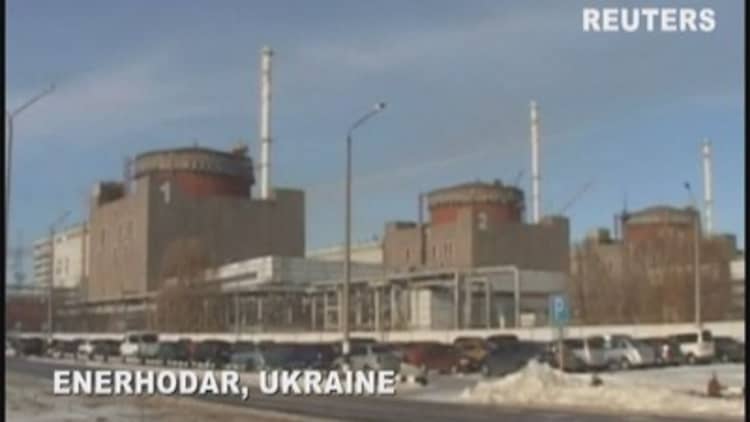Given the energy challenges Ukraine is facing—problems with coal supplies, and Russian threats to limit natural gas shipments—a failure at one of its nuclear facilities just added more unwanted bad news on the energy front, experts told CNBC.

The accident, which occurred last week but was first reported on Wednesday, resulted in a disruption of electricity but posed no threat to public health, according to officials. It occurred at the Zaporizhzhya facility in western Ukraine. An energy minister said he expected operations at the plant to return to normal by Friday, but Ukraine watchers said the incident underscored the insecurity of energy supply in the country.
"Any threat to the operation of Ukraine's nuclear facilities is a major headache for the country," said Marin Katusa, a portfolio manager and author of the book "The Colder War." "This is even more of an issue as the winter months roll in and Ukraine is highly dependent on Russian natural gas."
Natural gas accounts for about 40 percent of Ukraine's energy consumption, according to the U.S. Energy Information Administration. Coal makes up 28 percent, and nuclear accounts for 18 percent of consumption.
The European Union brokered a deal between Ukraine and Russia a month ago to resume the flow of Russian natural gas to Ukraine. However, Russia will require Ukraine to pay up front for deliveries going forward.
Read More Ukraine, Putin and the options that remain
In dealing with his neighbor to the south, Russian President Vladimir Putin has already exhibited a willingness to use every bit of leverage he has, Katusa said. Ukraine's Western allies are unlikely to be much help in providing energy security, he said, noting that Western Europe is not energy-independent itself.
The European Union got about 77 percent of its natural gas imports from Russia in 2012, the last year for which Eurostat has comprehensive data. Russia also supplied a third of the EU's crude oil imports that year.
"Without help from its Russian neighbor, Ukraine does not have the financial ability to solve its longer-term energy issue, and it is very unlikely that the U.S. and its (allies) will step in and foot the enormous cost of providing durable solutions," he added.
More than half of Ukraine's primary energy supply comes from uranium and coal resources, according to the EIA, but supply lines for the latter have been interrupted by fighting in the eastern part of the country.
The major mining region of Donbass has seen heavy fighting between troops loyal to the government in Kiev and pro-Russian separatists. The nation now faces challenges getting its coal supplies to electricity producers following the destruction of rail lines by the separatists, CNBC previously reported.
Read MoreUkraine may have an energy problem besides nat gas
The incident at Zaporizhzhya fortunately did not interrupt supply or involve nuclear assets, but it underscored fragility in the country, said Robert Bensh, managing partner of Pelicourt, a private equity firm with energy interests in Ukraine.
"Ukraine has been unable to source coal and to increase or even maintain gas production. While it has been successful in obtaining reverse supplies of gas from Slovakia, nuclear is critical to continued electricity supply," Bensh said.
The event also reminded the world of Ukraine's history with nuclear power, he said. An explosion at northern Ukraine's Chernobyl nuclear power plant in 1986 spread radioactivity over Ukraine and Europe, killing at least 31 people and causing serious long-term effects.
The Zaporizhzhya accident was caused by a short circuit in the power transmission system, rather than the reactor itself, Ukrainian Energy Minister Volodymyr Demchyshyn said on Wednesday. As such, there was no threat to the surrounding area, he said. French nuclear safety institute IRSN confirmed it had not detected any increased radioactivity in the area.
Read More Russian oil oligarch: '$60 and below is possible'
The perception that another part of Ukraine's energy portfolio is at risk has the potential to strain relations between the government in Kiev and the Ukrainian people, who have endured rising fuel costs.
"Anything that adds to the difficulties that Ukraine has in providing energy for its population is a problem for Kiev. With Ukraine's harsh winters, it can be a humanitarian in addition to a political problem," said Ian Brzezinski, former U.S. deputy assistant secretary of defense for Europe and NATO policy.
—CNBC's Dina Gusovsky and Reuters contributed reporting to this story.


